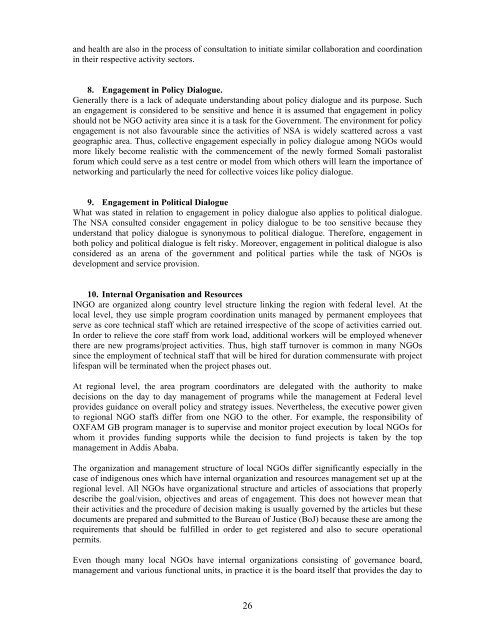Regional Reports - the European External Action Service
Regional Reports - the European External Action Service
Regional Reports - the European External Action Service
Create successful ePaper yourself
Turn your PDF publications into a flip-book with our unique Google optimized e-Paper software.
and health are also in <strong>the</strong> process of consultation to initiate similar collaboration and coordination<br />
in <strong>the</strong>ir respective activity sectors.<br />
8. Engagement in Policy Dialogue.<br />
Generally <strong>the</strong>re is a lack of adequate understanding about policy dialogue and its purpose. Such<br />
an engagement is considered to be sensitive and hence it is assumed that engagement in policy<br />
should not be NGO activity area since it is a task for <strong>the</strong> Government. The environment for policy<br />
engagement is not also favourable since <strong>the</strong> activities of NSA is widely scattered across a vast<br />
geographic area. Thus, collective engagement especially in policy dialogue among NGOs would<br />
more likely become realistic with <strong>the</strong> commencement of <strong>the</strong> newly formed Somali pastoralist<br />
forum which could serve as a test centre or model from which o<strong>the</strong>rs will learn <strong>the</strong> importance of<br />
networking and particularly <strong>the</strong> need for collective voices like policy dialogue.<br />
9. Engagement in Political Dialogue<br />
What was stated in relation to engagement in policy dialogue also applies to political dialogue.<br />
The NSA consulted consider engagement in policy dialogue to be too sensitive because <strong>the</strong>y<br />
understand that policy dialogue is synonymous to political dialogue. Therefore, engagement in<br />
both policy and political dialogue is felt risky. Moreover, engagement in political dialogue is also<br />
considered as an arena of <strong>the</strong> government and political parties while <strong>the</strong> task of NGOs is<br />
development and service provision.<br />
10. Internal Organisation and Resources<br />
INGO are organized along country level structure linking <strong>the</strong> region with federal level. At <strong>the</strong><br />
local level, <strong>the</strong>y use simple program coordination units managed by permanent employees that<br />
serve as core technical staff which are retained irrespective of <strong>the</strong> scope of activities carried out.<br />
In order to relieve <strong>the</strong> core staff from work load, additional workers will be employed whenever<br />
<strong>the</strong>re are new programs/project activities. Thus, high staff turnover is common in many NGOs<br />
since <strong>the</strong> employment of technical staff that will be hired for duration commensurate with project<br />
lifespan will be terminated when <strong>the</strong> project phases out.<br />
At regional level, <strong>the</strong> area program coordinators are delegated with <strong>the</strong> authority to make<br />
decisions on <strong>the</strong> day to day management of programs while <strong>the</strong> management at Federal level<br />
provides guidance on overall policy and strategy issues. Never<strong>the</strong>less, <strong>the</strong> executive power given<br />
to regional NGO staffs differ from one NGO to <strong>the</strong> o<strong>the</strong>r. For example, <strong>the</strong> responsibility of<br />
OXFAM GB program manager is to supervise and monitor project execution by local NGOs for<br />
whom it provides funding supports while <strong>the</strong> decision to fund projects is taken by <strong>the</strong> top<br />
management in Addis Ababa.<br />
The organization and management structure of local NGOs differ significantly especially in <strong>the</strong><br />
case of indigenous ones which have internal organization and resources management set up at <strong>the</strong><br />
regional level. All NGOs have organizational structure and articles of associations that properly<br />
describe <strong>the</strong> goal/vision, objectives and areas of engagement. This does not however mean that<br />
<strong>the</strong>ir activities and <strong>the</strong> procedure of decision making is usually governed by <strong>the</strong> articles but <strong>the</strong>se<br />
documents are prepared and submitted to <strong>the</strong> Bureau of Justice (BoJ) because <strong>the</strong>se are among <strong>the</strong><br />
requirements that should be fulfilled in order to get registered and also to secure operational<br />
permits.<br />
Even though many local NGOs have internal organizations consisting of governance board,<br />
management and various functional units, in practice it is <strong>the</strong> board itself that provides <strong>the</strong> day to<br />
26

















